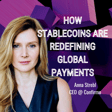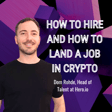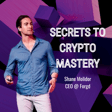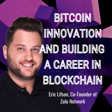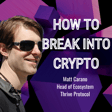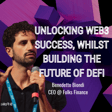
Inside the mind of a successful Web3 founder with Luc Falempin, CEO of Tokeny
In this episode, I spoke with Luc Falempin, CEO and Founder of Tokeny - Luc shared a huge amount of advice which he pulls from his experience of launching 2 successful companies over the last 10+ years.
We talked through Luc's journey as a serial entrepreneur, the key things he learned from his first business which helped him with Tokeny, how timing is everything when launching a startup, and how to avoid burnout. How to structure a successful organisation, how to build a successful career in Web3. What makes a good leader, Luc's advice for stepping into leadership for the first time, how to build a remote culture, what he likes bout Web3 and what he'd like to change... the list goes on!
Behind the blockchain is a series of conversations with leaders who have built successful products, teams and careers in Web3. You will get a chance to discover how successful individuals were able to accomplish their career objectives, the skills they have acquired, the mistakes and difficulties they encountered, and the advice they can offer you to help you reach your own career aspirations.

